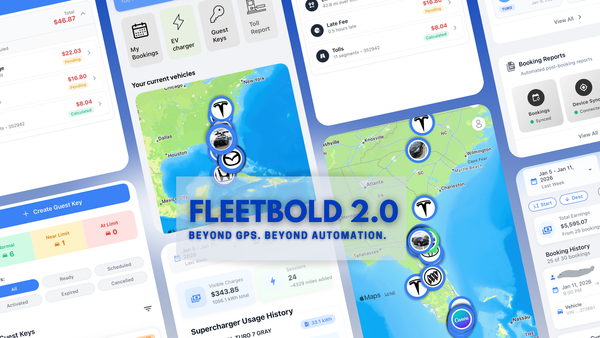Car Rentals and FIFA World Cup 2026: Why Operators Must Stay Ahead
The FIFA World Cup 2026 will bring millions of visitors to 11 U.S. cities, creating record-breaking demand for car rentals. Learn how operators can prepare, adjust pricing, and seize opportunities.

Imagine half a million fans landing in one city within a week, hotels filling up, rideshares overloaded, and travelers scrambling for cars to get around. Events of this scale don’t just create excitement, they completely reshape local demand for transportation. For anyone in the car rental business, staying ahead of these spikes is the difference between running out of vehicles and maximizing revenue. With the FIFA World Cup 2026 on the horizon — and other massive gatherings like CES, the NBA All-Star Game, and the Houston Rodeo — monitoring the event calendar has become as critical as maintaining your fleet.
Why Major Events Impact Car Rentals
Large-scale events bring hundreds of thousands of visitors into cities that normally operate at a steady rhythm. Suddenly, airports, hotels, and rideshare platforms experience overwhelming traffic, creating an overflow that often lands directly on car rental operators. For travelers, especially those visiting from abroad or other states, having their own vehicle feels safer, faster, and more reliable than waiting for limited transportation options.
The car rental business doesn’t just benefit from extra demand. These events push operators to think differently about pricing strategies, vehicle distribution, and even partnerships with local hotels or travel agencies. Those who prepare see a surge in both bookings and revenue, while those who overlook the calendar risk being caught unprepared.
FIFA World Cup 2026 Car Rentals: A Nationwide Surge
The FIFA World Cup 2026 will run from June to July across 16 cities in the United States, Mexico, and Canada. In the U.S. alone, 11 host cities will experience a surge of visitors unlike anything seen before:
- Atlanta, GA, A major hub for international flights, already one of the busiest airports in the world. Demand for rentals will extend far beyond the city center into surrounding areas.
- Boston, MA (Foxborough), With limited direct rail options to Gillette Stadium, many fans will look to car rentals to cover the distance from Boston Logan Airport to the suburbs.
- Dallas, TX (Arlington), AT&T Stadium is massive, and North Texas is spread out. Expect strong demand for larger vehicles and SUVs for families and groups.
- Houston, TX, NRG Stadium is centrally located, and the city is known for its car-first infrastructure, making rentals a natural choice for visitors.
- Kansas City, MO, Public transit is limited compared to other metros, so incoming fans will rely heavily on rental cars for mobility.
- Los Angeles, CA (Inglewood), SoFi Stadium is in the heart of a sprawling metro. Visitors flying into LAX or Burbank will need cars to move between matches, beaches, and tourist attractions.
- Miami, FL, Hard Rock Stadium is outside the city core, and South Florida is famous for car-dependent travel. International arrivals from Latin America will drive high demand.
- New York/New Jersey (MetLife Stadium), With matches in East Rutherford, many international fans will prefer the flexibility of a car to move between airports, hotels, and venues across two states.
- Philadelphia, PA, A dense city with strong regional tourism. Expect demand for short-term rentals as fans travel between Philly, New York, and Washington.
- San Francisco Bay Area, CA (Santa Clara), Levi’s Stadium sits far from San Francisco itself, making car rentals essential for international travelers landing at SFO.
- Seattle, WA, Lumen Field is downtown, but visitors from Canada and across the Pacific Northwest will likely opt for road trips and rentals for flexibility.
Across all these cities, the World Cup is expected to attract over 5.5 million fans. Unlike one-off events, the tournament spans six weeks, with festivals, celebrations, and fan zones extending the demand well beyond matchdays. Surveys already show one in six Americans plan to road trip to host cities, and nearly half of international visitors expect to use cars as their primary transportation.
For the car rental industry, this is not just a regional spike. It’s a nationwide surge that will test fleet distribution, pricing strategies, and operational readiness like never before.
Other Events in 2025–2026 That Increase Car Rental Demand
While the FIFA World Cup dominates headlines, several other events between late 2025 and early 2026 will generate powerful surges in demand. CES in Las Vegas every January attracts more than 170,000 attendees and floods the local market with international visitors. The NBA All-Star Game in February 2026 will turn Los Angeles into a luxury travel hub for a weekend. The Houston Rodeo, with 2.7 million attendees in 2025, is expected to surpass that in 2026. Music festivals like EDC Las Vegas and fan conventions such as MegaCon Orlando also draw hundreds of thousands of people, many of whom depend on rental cars to move around.
These events may not stretch across multiple weeks like the World Cup, but they still put enormous pressure on local fleets and infrastructure. Operators who ignore them risk missed opportunities and frustrated customers.
How Car Rental Operators Can Prepare for FIFA 2026
The biggest advantage lies in awareness. By actively monitoring convention schedules, sporting calendars, and cultural festivals, rental operators can anticipate where and when demand will spike. This allows businesses to shift vehicles into the right markets, prepare service infrastructure, and implement early booking incentives.
Some operators take it further by collaborating with hotels, travel agencies, and local businesses to create bundled offers that appeal to event travelers. Others adjust their policies to match the reality of late-night event schedules, offering extended pickup and drop-off options that align with fan behavior.
Final Thoughts
The next 18 months will bring an extraordinary lineup of events to the United States, culminating in the FIFA World Cup 2026. For car rental businesses, this is more than just a busy season — it is a nationwide stress test and an opportunity to set records. Those who treat the event calendar with the same seriousness as fleet maintenance will be the ones who stand out, capturing market share, growing revenue, and strengthening long-term customer loyalty.
FAQs About Car Rentals and FIFA World Cup 2026
1. How will the FIFA World Cup 2026 affect car rentals in the United States?
The tournament will bring over 5.5 million fans across 11 U.S. host cities, creating record-breaking demand for car rentals, especially in markets like New York, Miami, Los Angeles, and Dallas.
2. Should I book a rental car early for the FIFA World Cup 2026?
Yes. With millions of visitors expected, cars will sell out months in advance. Booking early guarantees availability and often better pricing.
3. Which U.S. cities will see the biggest car rental demand during the World Cup?
All 11 host cities — Atlanta, Boston, Dallas, Houston, Kansas City, Los Angeles, Miami, New York/New Jersey, Philadelphia, San Francisco Bay Area, and Seattle — will face spikes, with the largest impacts in cities that already have high international arrivals.
4. Will rental car prices increase during FIFA World Cup 2026?
Absolutely. Dynamic pricing will push rates much higher as inventory gets booked. Many hosts and rental operators are already preparing for price surges.
5. Are SUVs and larger vehicles more popular during major events like the World Cup?
Yes. Families and groups often travel together, so SUVs and vans are the first to sell out. Operators should plan fleet allocation accordingly.
6. Can Turo and peer-to-peer car rentals benefit from the World Cup?
Definitely. Guests who can’t find cars through traditional rental companies will turn to Turo and similar platforms, giving hosts a unique opportunity to boost earnings.
7. What other events in 2025–2026 will increase car rental demand?
CES Las Vegas, the NBA All-Star Game, Houston Rodeo, MegaCon Orlando, and EDC Las Vegas are just a few major events expected to drive high demand before the World Cup.
8. Is public transportation enough in World Cup host cities?
In most U.S. host cities, public transit isn’t designed for the scale of World Cup crowds. Renting a car will remain the most reliable way to move between airports, hotels, and stadiums.
9. How should rental operators prepare for FIFA World Cup 2026?
Operators should monitor event schedules, relocate fleet capacity to host cities, adopt dynamic pricing, and partner with hotels or agencies to capture demand early.
10. Will international visitors rent cars during the World Cup?
Yes, especially in cities like Miami, New York, Los Angeles, and Dallas where international flights are highest. Many travelers prefer renting a car for flexibility over relying on local transportation.





